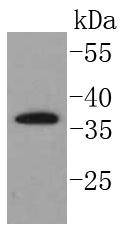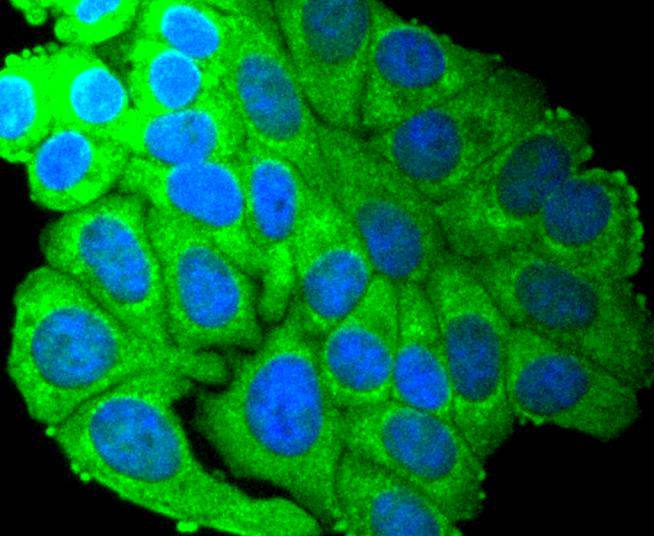Product Name :
SCF polyclonal antibody Background :
Stem cell factor (SCF) is the ligand for the transmembrane tyrosine kinase receptor proto-oncogene c-Kit. SCF, also designated KL, MGF and SLF, is a pleiotropic cytokine that has two alternatively spliced forms, 248 and 220 amino acids in length in human and mouse systems, respectively. Both the larger form and the smaller form are cleaved to produce soluble forms. The smaller splice variant lacks the proteolytic cleavage site, between amino acids 149 and 177 of the larger SCF form. The larger form of SCF is expressed in fibroblasts, brain and thymus, while the smaller form is found in spleen, testis, placenta and cerebellum. The SCF ligand is essential for the development of germ cells, hematopoietic progenitor cells and melanocyte precursors. SCF can stimulate the proliferation of mature mast cells as well as the maturation and proliferation of immature mast cells. Product :
Rabbit IgG, 1mg/ml in PBS with 0.02% sodium azide, 50% glycerol, pH7.2 Storage&Stability :
Store at +4°C after thawing. Aliquot store at -20°C or -80°C. Avoid repeated freeze / thaw cycles. Specificity :
SCF polyclonal antibody detects endogenous levels of SCF protein. Immunogen :
recombinant protein Conjugate :
Unconjugated Modification :
Unmodification
SCF polyclonal antibody Background :
Stem cell factor (SCF) is the ligand for the transmembrane tyrosine kinase receptor proto-oncogene c-Kit. SCF, also designated KL, MGF and SLF, is a pleiotropic cytokine that has two alternatively spliced forms, 248 and 220 amino acids in length in human and mouse systems, respectively. Both the larger form and the smaller form are cleaved to produce soluble forms. The smaller splice variant lacks the proteolytic cleavage site, between amino acids 149 and 177 of the larger SCF form. The larger form of SCF is expressed in fibroblasts, brain and thymus, while the smaller form is found in spleen, testis, placenta and cerebellum. The SCF ligand is essential for the development of germ cells, hematopoietic progenitor cells and melanocyte precursors. SCF can stimulate the proliferation of mature mast cells as well as the maturation and proliferation of immature mast cells. Product :
Rabbit IgG, 1mg/ml in PBS with 0.02% sodium azide, 50% glycerol, pH7.2 Storage&Stability :
Store at +4°C after thawing. Aliquot store at -20°C or -80°C. Avoid repeated freeze / thaw cycles. Specificity :
SCF polyclonal antibody detects endogenous levels of SCF protein. Immunogen :
recombinant protein Conjugate :
Unconjugated Modification :
Unmodification
-
 Western blot analysis of SCF on Raji cells lysates using anti-SCF antibody at 1/1,000 dilution.
Western blot analysis of SCF on Raji cells lysates using anti-SCF antibody at 1/1,000 dilution. -
 ICC staining SCF in HepG2 cells (green). The nuclear counter stain is DAPI (blue). Cells were fixed in paraformaldehyde, permeabilised with 0.25% Triton X100/PBS.
ICC staining SCF in HepG2 cells (green). The nuclear counter stain is DAPI (blue). Cells were fixed in paraformaldehyde, permeabilised with 0.25% Triton X100/PBS.
Bioworld Biotech only provide peptides for our antibodies and do not provide additional peptide customization services.
Price/Size :
USD 368/1mg/vial
Tips:
For phospho antibody, we provide phospho peptide(0.5mg) and non-phospho peptide(0.5mg).Describe :
Blocking peptides are peptides that bind specifically to the target antibody and block antibody binding. These peptide usually contains the epitope recognized by the antibody. Antibodies bound to the blocking peptide no longer bind to the epitope on the target protein. This mechanism is useful when non-specific binding is an issue, for example, in Western blotting (WB) and Immunohistochemistry (IHC). By comparing the staining from the blocked antibody versus the antibody alone, one can see which staining is specific; Specific binding will be absent from the western blot or IHC performed with the neutralized antibody.Formula:
Synthetic peptide was lyophilized with 100% acetonitrile and is supplied as a powder. Reconstitute with 0.1 ml DI water for a final concentration of 10 mg/ml.The purity is >90%,tested by HPLC and MS.
Storage:
The freeze-dried powder is more stable. For short time at 2-8°C. For long term storage store at -20°C.
Note :
This product is for research use only (RUO only). Not for use in diagnostic or therapeutic procedures.
 SCF polyclonal antibody
SCF polyclonal antibody  Datasheet
Datasheet COA
COA MSDS
MSDS SHIP
SHIP